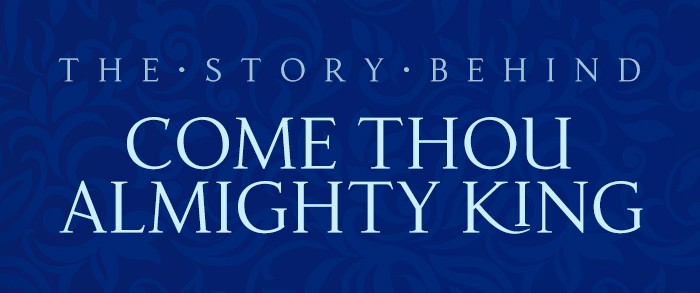Come, Thou Almighty King gives the singer an opportunity to worship the fullness of God – that is, the Trinity. Verse one addresses the Father, followed by verse two addressing Jesus, the Holy Spirit in verse three, and finally, the Trinity in verse four. The lyrics are a full dedication to the ruler of the universe, and were used in direct rebellion to a certain ruler of the earth.
Come, Thou Almighty King was written in England, 1757. The author is unknown, which is rather uncommon when it comes to popular hymns, but there is a suspected reason for author secrecy in this case, and that reason has to do with the hymn’s connection to England’s national anthem.
Roughly fifteen years before Come, Thou Almighty King was written, God Save Our Gracious King became accepted as England’s national anthem. The hymn used an identical tune to the national anthem, and there are a few theories as to why. One theory suggests that the hymn was written as a sequel to the national anthem; first you would sing a prayer for the king, then follow it up with a praise to God. However, another theory says that the hymn was always intended as an act of rebellion. In this case, the hymn’s purpose would be to give anyone not loyal to the king of England different lyrics to sing when the national anthem was being played. Whether the hymn was meant to be rebellious or not, that is exactly how it was used in America during the Revolutionary War.
With King George III came the American Revolution. Of course, Americans had more reason than most to dislike an anthem that pleaded for God to save their very oppressor. In turn, they had more reason than most to love a hymn that took the anthem’s tune and morphed it into a hymn of worship to God. As it were, the hymn gained popularity in America during the Revolution. The most famous example of Come, Thou Almighty King being used in rebellion comes from New York City.
On August 22, 1776, the British began an occupation of New York City that lasted seven years. Martial law was imposed, and the Americans were at the mercy of British commanders. Of course, New Yorkers were less than thrilled about their new neighbors. One Sunday, Americans and British soldiers alike attended church – a meeting of little comradery and much tension. At the end of the service, the soldiers ordered the congregation to sing God Save Our Gracious King. Under threat, the organist began playing the tune. The soldiers began singing,
God save our gracious King,
Long live our noble King…
but it was quickly drowned out by the American congregation’s singing,
Come, Thou Almighty King,
Help us Thy name to sing;
Help us to praise.
Father all-glorious o’er all victorious,
Come and reign over us Ancient of Days!
That Sunday, and the singing of two different songs – hymn and anthem – exemplify where each country’s allegiance stood. It is therefore no surprise at all why those who chose ‘Almighty God’ over ‘Gracious King’ ended up the victors.
Article ©2022 hymncharts.com. Contact us for permission to reprint.
Hymncharts subscribers: login to download an exclusive, shorter blurb suitable for a bulletin or other church publications.
Download Come, Thou Almighty King:
Download sheet music, chord charts, tracks, multitracks and instrumental parts for Come, Thou Almighty King exclusively with a hymncharts subscription. You won’t find this arrangement on any other website.




2 Comments. Leave new
Other sources say Charles Wesley wrote this. Interesting article though!
Thanks! It does seem to be a mystery! Here’s a blurb from wikipedia: “The earliest known publication of this hymn is a leaflet that was bound into the 6th edition of George Whitefield’s Collection of Hymns for Social Worship, 1757. In this leaflet, the hymn had five verses of seven lines each, and was titled “An Hymn to the Trinity.”[1] The leaflet also contained the hymn “Jesus, Let Thy Pitying Eye” by Charles Wesley, and because of this hymnologist Daniel Sedgwick attributed “Come Thou Almighty King” to Wesley as well.[2] However, there is no record of this hymn in any of Wesley’s collections of hymns, nor is there any hymn known to be Wesley’s that uses the same meter as this hymn does (6,6,4,6,6,6,4).”